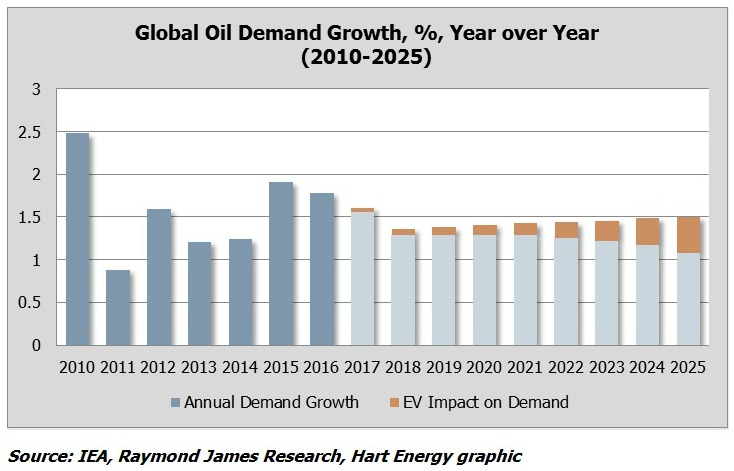
Electric cars and their potential to absorb global oil market share are headline news as Tesla and other manufacturers ratchet up production of cars and buses. Where once oil and gas producers feared peak oil production, now they worry that the rise of electric vehicles (EV) will put a lid on oil demand.
But the reality may be less dramatic. A recent report from Raymond James analysts, led by Pavel Molchanov, concludes that “fears about EV-related oil demand displacement have been way overblown” and no plausible scenario exists for EV growth to cap oil demand over the next decade.
As they built their analysis of EVs’ impact through 2025, the analysts said, they erred on the side of assuming faster rather than slower EV adoption. They assumed that oil demand would continue to grow at 1.4% annually, as it has on average over the past 30 years, and factored in a generous 15 times jump in EV market share. This results in a tally of 11.5 million barrels per day (MMbbl/d) of global oil demand in 2024, higher than in 2016. Even if EV sales surged by 40% annually over the same period, the global growth in appetite for oil would still be some 1.3 MMbbl/d. Healthy, in other words.
Just as important as oil demand numbers to consider are caveats regarding EV acceptance by consumers. First, the vehicles are pricier than their conventional car counterparts, and batteries are costly. Consumers are often put off by the EV driving range, which is generally rangebound at 100 miles. There are additional concerns about sufficient numbers of charging stations and how long charging will take.

The Raymond James report points out that in countries like China and India, major drivers of demand growth, electricity generation is “coal-centric,” raising the question of whether these are “actually coal vehicles.” There aren’t many options for EVs in the SUV and light truck categories, and still required is buildout of a new supply chain to deal with battery life-cycle costs and disposal. Ultimately, the analysts note, while public policy broadly supports EV adoption, “the industry will need to support itself on a purely economic basis.”
Defined as both all-electric vehicles and plug-in hybrids, but excluding conventional hybrids, EVs reached a global market share i.e., percentage of new car sales, of 1% in 2016, but should reach about 1.5% by 2017 and 4% in 2020, the analysts said.
Overall, the report estimates that every EV sold worldwide between 2012 and 2020 will have the aggregate effect of displacing 263,000 bbl/d of petroleum demand, shaving off 0.25% of global oil demand in 2020. Even under the firm’s most aggressive scenario, all the world’s EVs on the road by 2025 “would displace only 1.6 MMbbl/d of demand. “
In the electric bus market, which is particularly significant in China, “we estimate the cumulative impact on oil demand at 71,000 bbl/d as of 2017, rising to 162,000 bbl/d in 2020. For 2025, the aggressive market share scenario equates to a cumulative impact of 423,000 bbl/d.”
As for petroleum “phase-out” targets, which have been set for varying years in the future by China, Norway, the Netherlands, the U.K. and France, the transition to 100% EV sales is “too distant in the future to be meaningful from the standpoint of any investable timeframe,” the report said. Further, achieving these mandates still depends on consumer willingness to comply, and the mandate does not ban the use of existing conventional cars.
Don’t look for a significant impact from EVs on oil demand until the mid-2020s, the analysts forecast. “But even aggressive sales assumptions do not indicate the likelihood of peak oil demand until after 2025, more likely after 2030.”
Recommended Reading
Financiers: Family Offices Worldwide are Queuing to Invest in E&P
2024-10-11 - U.S. family offices have stepped in quickly to fill the void left by other investors while family desks abroad have been slow to move but they’re watching closely, financiers say.
Comments
Add new comment
This conversation is moderated according to Hart Energy community rules. Please read the rules before joining the discussion. If you’re experiencing any technical problems, please contact our customer care team.


